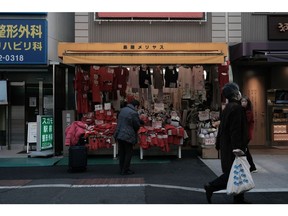Article content
(Bloomberg) — Japan’s plan to phase out utility subsidies is likely to push inflation toward 3% over the summer, potentially complicating the Bank of Japan’s thinking on the path of interest rate hikes.
The government will end its subsidies on electricity and gas charges at the end of May while keeping its gasoline measures in place for the time being, economy minister Ken Saito said Friday. The announcement comes after data earlier in the day showed prices in Tokyo, a leading indicator of the national trend, rose at a slightly slower pace of 2.4% in March.
Article content
Read more: Tokyo Inflation Slowdown Won’t Knock the BOJ Off Rate Hike Path
The end of the utility subsidies will likely push up the nation’s key inflation gauge by half a percentage point between May and July, economists say, with an increase in renewable energy-related levies adding an additional 0.25 percentage point.
All told the upward force on inflation from the change in government policy will reach 1.25 percentage point by July compared with a year-on-year drag on the index in January, according to Yoshiki Shinke, senior executive economist at Dai-Ichi Life Research Institute.
The changes will intensify the cost-of-living crunch for households even after they have cut back on spending in real terms, causing a drag on the economy. Higher energy costs are likely to feed into prices across the economy over time, shifting the underlying trend and possibly raising inflation expectations.
“I’m surprised by the government’s decision to end the program at this point,” said Tsuyoshi Ueno, senior economist at NLI Research Institute. “This will push up inflation and it’s a factor that may push the BOJ toward a rate hike especially in light of the weak yen.”
Article content
The government’s subsidy program has been masking the real strength of inflation, since Prime Minister Fumio Kishida introduced these price relief measures in early 2023 to keep a lid on utility costs.
Economists and policymakers are well aware of the subsidy distortions affecting the consumer price index and so the changes in the inflation rate on policy are unlikely to have an immediate impact on policy. Still, stronger inflation could influence market expectations over possible rate hikes and would present better optics for an earlier move by the BOJ.
A majority of polled economists see the central bank raising rates again by October, with 23% flagging July as the most likely timing.
“A 0.5 percentage point increase appears quite large, numerically speaking,” said Takahide Kiuchi, executive economist at the Nomura Research Institute. “If the gauge hits 3%, markets will take note.”
—With assistance from Yoshiaki Nohara and Keiko Ujikane.
Share this article in your social network

